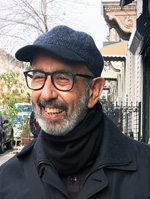
LOUISVILLE, Kentucky — I climbed the cheap metal steps to one of the many cheap “temporary” classroom buildings that sprouted like weeds between my Spring 1965 campus visit to SUNY Buffalo [UB] and the August start of freshman year.
The classic Gothic campus on Main Street had turned into a muddy mobile home park, but I was happy to be there.
Not quite 17, I celebrated as my parents drove off in tears, leaving me 400 miles from home. They had told me to choose a state school, and the map told me Buffalo was as far as I could get from Brooklyn. A bonus was UB’s academic reputation, good enough for the elitists in my high school to express surprise that I had been accepted.
UB changed me. By the end of my first semester, I had traded my Weejuns, Madras shirts and cuffed chinos for work shirts, work boots and faded jeans. I had no idea what it meant to think like an intellectual, but I had figured out how to look like one.
Fifty-five years later, I still wear work boots, work shirts and faded jeans, and I’m still celebrating the path UB set me on: intellectually, socially, ethically and politically.
It started that fall with my anxious walk up those metal stairs to my first college class: Steve Klipstein’s English 101. A first-year graduate student, Steve may have been as frightened as I was, but I studied through him, and I studied him.
I worked hard to meet his standards, throwing myself into the first serious writing assignment: Philip Roth’s novella, Goodbye Columbus. I earned an A and these written words from Steve:
“Your perceptions are extremely cogent, and your specific examples from the story are used to perfection for your purpose. It is a difficult thing to relate specific examples to generalized conclusions, but you do this extremely well.”
Steve’s praise had me hooked; his knowledge and teaching skills had me wanting more. One night we watched The Informer, a 1935 Academy Award-winning film about the Irish rebellion. At the next class meeting, we analyzed the film, with a Clancy Brothers album playing in the background. This was new for someone whose idea of a thought-provoking movie was Old Yeller.
Suddenly, a sinister-looking guy burst in, sporting a soiled trench coat, Fedora hat, atrocious Irish accent, and toy pistol.
“Klipstein,” he sneered, “you betrayed us, and you will pay.”
The bad actor with the bad accent dragged Steve out of the trailer, and we heard a gunshot. A few seconds later, they returned to the room, laughing. It was pure silliness, and pure fun. The phony Irishman turned out to be Jeremy Taylor, campus radical and editor of the student newspaper. The episode introduced me to film as serious art and art as serious fun.
Gradually, I became more involved in campus life: writing UB football game previews for the student paper, attending evening lectures on every imaginable subject, marching against the Vietnam War, and making national news with food poisoning that landed 300 of us in a makeshift infirmary.
I was released without missing any football games and studied hard when the material was interesting: History, Geography, Logic, Bible as Literature. At night, I hung out with friends, engaging in intellectual banter, shooting pool, indulging in Bocce Club pizza and trying (mostly unsuccessfully) to keep my pipe lit.
I joined the UB crew team when I learned I would get a team jacket. But Crew ended badly, when I was thrust into the role of coxswain for our season-ending tournament. After a last-place finish, our coach consoled us, observing that we had rowed twice as far as any other crew.
My career as a political operative ended as badly as crew. In the fall of 1968, with a presidential election looming, I led a campus group supporting Sen. Eugene McCarthy, Democratic anti-war candidate. Staffing a table in the student union, I was approached one day by a well-known campus radical and hell raiser who drew me into a friendly conversation about the likelihood that McCarthy could actually stop the war.
I was no match for the well-read Marxist, but I listened. As his voice grew louder, a crowd gathered to listen to what increasingly took on the appearance of a one-sided debate. When several onlookers challenged the radical, and the discussion turned into a verbal brawl, I crawled under the table and disappeared into the crowd.
My efforts failed to swing the election, and our marching failed to end the war, but I finished the year with decent grades and excitement about the future. Each succeeding year, I felt more at home with bigger ideas than I had ever entertained in Brooklyn. I wasn’t nearly as smart as I thought I was, but I at least fit into my “uniform.”
I graduated in the spring of 1969, my parents in attendance. The night before, we went to see the movie version of Goodbye, Columbus, lower in quality than either the novella or The Informer. When we left the theater, my parents lit into me for taking them to what they considered a trashy, anti-Semitic movie.
With the critical insight developed over four years at UB, I knew they were right. However, with the maturity of a 20-year-old, I didn’t tell them.
*
Michael Ginsberg is a retired teacher and freelance journalist based in Louisville, Kentucky.
I saw Goodbye Columbus twice and enjoyed it immensely both times. Anti Semitic?? I guess it takes an intellectual family and their college professor son to perceive the damage. Like you I’m a Jewish kid from Brooklyn. My undergrad days were spent in calm at
NYU. (class of 1955)I never met a stomping radical like yourself.
I really enjoyed your article.
Ira Spector